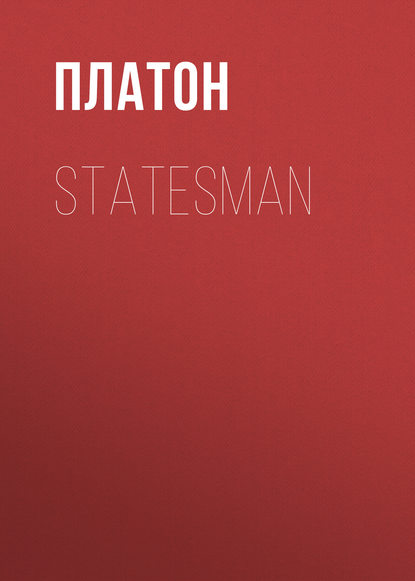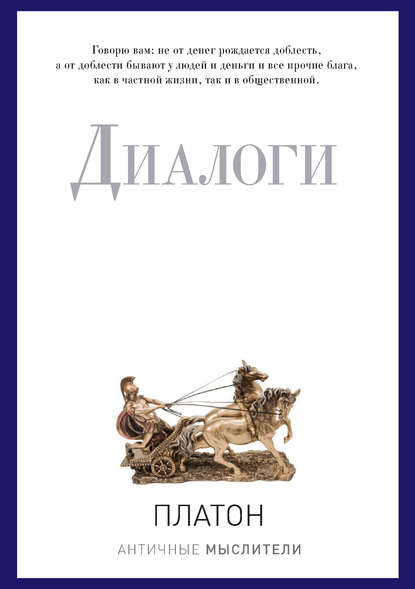 Полная версия
Полная версияПолная версия:
Платон Statesman
- + Увеличить шрифт
- - Уменьшить шрифт

Plato
Statesman
INTRODUCTION AND ANALYSIS
In the Phaedrus, the Republic, the Philebus, the Parmenides, and the Sophist, we may observe the tendency of Plato to combine two or more subjects or different aspects of the same subject in a single dialogue. In the Sophist and Statesman especially we note that the discussion is partly regarded as an illustration of method, and that analogies are brought from afar which throw light on the main subject. And in his later writings generally we further remark a decline of style, and of dramatic power; the characters excite little or no interest, and the digressions are apt to overlay the main thesis; there is not the 'callida junctura' of an artistic whole. Both the serious discussions and the jests are sometimes out of place. The invincible Socrates is withdrawn from view; and new foes begin to appear under old names. Plato is now chiefly concerned, not with the original Sophist, but with the sophistry of the schools of philosophy, which are making reasoning impossible; and is driven by them out of the regions of transcendental speculation back into the path of common sense. A logical or psychological phase takes the place of the doctrine of Ideas in his mind. He is constantly dwelling on the importance of regular classification, and of not putting words in the place of things. He has banished the poets, and is beginning to use a technical language. He is bitter and satirical, and seems to be sadly conscious of the realities of human life. Yet the ideal glory of the Platonic philosophy is not extinguished. He is still looking for a city in which kings are either philosophers or gods (compare Laws).
The Statesman has lost the grace and beauty of the earlier dialogues. The mind of the writer seems to be so overpowered in the effort of thought as to impair his style; at least his gift of expression does not keep up with the increasing difficulty of his theme. The idea of the king or statesman and the illustration of method are connected, not like the love and rhetoric of the Phaedrus, by 'little invisible pegs,' but in a confused and inartistic manner, which fails to produce any impression of a whole on the mind of the reader. Plato apologizes for his tediousness, and acknowledges that the improvement of his audience has been his only aim in some of his digressions. His own image may be used as a motto of his style: like an inexpert statuary he has made the figure or outline too large, and is unable to give the proper colours or proportions to his work. He makes mistakes only to correct them – this seems to be his way of drawing attention to common dialectical errors. The Eleatic stranger, here, as in the Sophist, has no appropriate character, and appears only as the expositor of a political ideal, in the delineation of which he is frequently interrupted by purely logical illustrations. The younger Socrates resembles his namesake in nothing but a name. The dramatic character is so completely forgotten, that a special reference is twice made to discussions in the Sophist; and this, perhaps, is the strongest ground which can be urged for doubting the genuineness of the work. But, when we remember that a similar allusion is made in the Laws to the Republic, we see that the entire disregard of dramatic propriety is not always a sufficient reason for doubting the genuineness of a Platonic writing.
The search after the Statesman, which is carried on, like that for the Sophist, by the method of dichotomy, gives an opportunity for many humorous and satirical remarks. Several of the jests are mannered and laboured: for example, the turn of words with which the dialogue opens; or the clumsy joke about man being an animal, who has a power of two-feet – both which are suggested by the presence of Theodorus, the geometrician. There is political as well as logical insight in refusing to admit the division of mankind into Hellenes and Barbarians: 'if a crane could speak, he would in like manner oppose men and all other animals to cranes.' The pride of the Hellene is further humbled, by being compared to a Phrygian or Lydian. Plato glories in this impartiality of the dialectical method, which places birds in juxtaposition with men, and the king side by side with the bird-catcher; king or vermin-destroyer are objects of equal interest to science (compare Parmen.). There are other passages which show that the irony of Socrates was a lesson which Plato was not slow in learning – as, for example, the passing remark, that 'the kings and statesmen of our day are in their breeding and education very like their subjects;' or the anticipation that the rivals of the king will be found in the class of servants; or the imposing attitude of the priests, who are the established interpreters of the will of heaven, authorized by law. Nothing is more bitter in all his writings than his comparison of the contemporary politicians to lions, centaurs, satyrs, and other animals of a feebler sort, who are ever changing their forms and natures. But, as in the later dialogues generally, the play of humour and the charm of poetry have departed, never to return.
Still the Politicus contains a higher and more ideal conception of politics than any other of Plato's writings. The city of which there is a pattern in heaven (Republic), is here described as a Paradisiacal state of human society. In the truest sense of all, the ruler is not man but God; and such a government existed in a former cycle of human history, and may again exist when the gods resume their care of mankind. In a secondary sense, the true form of government is that which has scientific rulers, who are irresponsible to their subjects. Not power but knowledge is the characteristic of a king or royal person. And the rule of a man is better and higher than law, because he is more able to deal with the infinite complexity of human affairs. But mankind, in despair of finding a true ruler, are willing to acquiesce in any law or custom which will save them from the caprice of individuals. They are ready to accept any of the six forms of government which prevail in the world. To the Greek, nomos was a sacred word, but the political idealism of Plato soars into a region beyond; for the laws he would substitute the intelligent will of the legislator. Education is originally to implant in men's minds a sense of truth and justice, which is the divine bond of states, and the legislator is to contrive human bonds, by which dissimilar natures may be united in marriage and supply the deficiencies of one another. As in the Republic, the government of philosophers, the causes of the perversion of states, the regulation of marriages, are still the political problems with which Plato's mind is occupied. He treats them more slightly, partly because the dialogue is shorter, and also because the discussion of them is perpetually crossed by the other interest of dialectic, which has begun to absorb him.
The plan of the Politicus or Statesman may be briefly sketched as follows: (1) By a process of division and subdivision we discover the true herdsman or king of men. But before we can rightly distinguish him from his rivals, we must view him, (2) as he is presented to us in a famous ancient tale: the tale will also enable us to distinguish the divine from the human herdsman or shepherd: (3) and besides our fable, we must have an example; for our example we will select the art of weaving, which will have to be distinguished from the kindred arts; and then, following this pattern, we will separate the king from his subordinates or competitors. (4) But are we not exceeding all due limits; and is there not a measure of all arts and sciences, to which the art of discourse must conform? There is; but before we can apply this measure, we must know what is the aim of discourse: and our discourse only aims at the dialectical improvement of ourselves and others. – Having made our apology, we return once more to the king or statesman, and proceed to contrast him with pretenders in the same line with him, under their various forms of government. (5) His characteristic is, that he alone has science, which is superior to law and written enactments; these do but spring out of the necessities of mankind, when they are in despair of finding the true king. (6) The sciences which are most akin to the royal are the sciences of the general, the judge, the orator, which minister to him, but even these are subordinate to him. (7) Fixed principles are implanted by education, and the king or statesman completes the political web by marrying together dissimilar natures, the courageous and the temperate, the bold and the gentle, who are the warp and the woof of society.
The outline may be filled up as follows: —
SOCRATES: I have reason to thank you, Theodorus, for the acquaintance of Theaetetus and the Stranger.
THEODORUS: And you will have three times as much reason to thank me when they have delineated the Statesman and Philosopher, as well as the Sophist.
SOCRATES: Does the great geometrician apply the same measure to all three? Are they not divided by an interval which no geometrical ratio can express?
THEODORUS: By the god Ammon, Socrates, you are right; and I am glad to see that you have not forgotten your geometry. But before I retaliate on you, I must request the Stranger to finish the argument…
The Stranger suggests that Theaetetus shall be allowed to rest, and that Socrates the younger shall respond in his place; Theodorus agrees to the suggestion, and Socrates remarks that the name of the one and the face of the other give him a right to claim relationship with both of them. They propose to take the Statesman after the Sophist; his path they must determine, and part off all other ways, stamping upon them a single negative form (compare Soph.).
The Stranger begins the enquiry by making a division of the arts and sciences into theoretical and practical – the one kind concerned with knowledge exclusively, and the other with action; arithmetic and the mathematical sciences are examples of the former, and carpentering and handicraft arts of the latter (compare Philebus). Under which of the two shall we place the Statesman? Or rather, shall we not first ask, whether the king, statesman, master, householder, practise one art or many? As the adviser of a physician may be said to have medical science and to be a physician, so the adviser of a king has royal science and is a king. And the master of a large household may be compared to the ruler of a small state. Hence we conclude that the science of the king, statesman, and householder is one and the same. And this science is akin to knowledge rather than to action. For a king rules with his mind, and not with his hands.
But theoretical science may be a science either of judging, like arithmetic, or of ruling and superintending, like that of the architect or master-builder. And the science of the king is of the latter nature; but the power which he exercises is underived and uncontrolled, – a characteristic which distinguishes him from heralds, prophets, and other inferior officers. He is the wholesale dealer in command, and the herald, or other officer, retails his commands to others. Again, a ruler is concerned with the production of some object, and objects may be divided into living and lifeless, and rulers into the rulers of living and lifeless objects. And the king is not like the master-builder, concerned with lifeless matter, but has the task of managing living animals. And the tending of living animals may be either a tending of individuals, or a managing of herds. And the Statesman is not a groom, but a herdsman, and his art may be called either the art of managing a herd, or the art of collective management: – Which do you prefer? 'No matter.' Very good, Socrates, and if you are not too particular about words you will be all the richer some day in true wisdom. But how would you subdivide the herdsman's art? 'I should say, that there is one management of men, and another of beasts.' Very good, but you are in too great a hurry to get to man. All divisions which are rightly made should cut through the middle; if you attend to this rule, you will be more likely to arrive at classes. 'I do not understand the nature of my mistake.' Your division was like a division of the human race into Hellenes and Barbarians, or into Lydians or Phrygians and all other nations, instead of into male and female; or like a division of number into ten thousand and all other numbers, instead of into odd and even. And I should like you to observe further, that though I maintain a class to be a part, there is no similar necessity for a part to be a class. But to return to your division, you spoke of men and other animals as two classes – the second of which you comprehended under the general name of beasts. This is the sort of division which an intelligent crane would make: he would put cranes into a class by themselves for their special glory, and jumble together all others, including man, in the class of beasts. An error of this kind can only be avoided by a more regular subdivision. Just now we divided the whole class of animals into gregarious and non-gregarious, omitting the previous division into tame and wild. We forgot this in our hurry to arrive at man, and found by experience, as the proverb says, that 'the more haste the worse speed.'
And now let us begin again at the art of managing herds. You have probably heard of the fish-preserves in the Nile and in the ponds of the Great King, and of the nurseries of geese and cranes in Thessaly. These suggest a new division into the rearing or management of land-herds and of water-herds: – I need not say with which the king is concerned. And land-herds may be divided into walking and flying; and every idiot knows that the political animal is a pedestrian. At this point we may take a longer or a shorter road, and as we are already near the end, I see no harm in taking the longer, which is the way of mesotomy, and accords with the principle which we were laying down. The tame, walking, herding animal, may be divided into two classes – the horned and the hornless, and the king is concerned with the hornless; and these again may be subdivided into animals having or not having cloven feet, or mixing or not mixing the breed; and the king or statesman has the care of animals which have not cloven feet, and which do not mix the breed. And now, if we omit dogs, who can hardly be said to herd, I think that we have only two species left which remain undivided: and how are we to distinguish them? To geometricians, like you and Theaetetus, I can have no difficulty in explaining that man is a diameter, having a power of two feet; and the power of four-legged creatures, being the double of two feet, is the diameter of our diameter. There is another excellent jest which I spy in the two remaining species. Men and birds are both bipeds, and human beings are running a race with the airiest and freest of creation, in which they are far behind their competitors; – this is a great joke, and there is a still better in the juxtaposition of the bird-taker and the king, who may be seen scampering after them. For, as we remarked in discussing the Sophist, the dialectical method is no respecter of persons. But we might have proceeded, as I was saying, by another and a shorter road. In that case we should have begun by dividing land animals into bipeds and quadrupeds, and bipeds into winged and wingless; we should than have taken the Statesman and set him over the 'bipes implume,' and put the reins of government into his hands.
Here let us sum up: – The science of pure knowledge had a part which was the science of command, and this had a part which was a science of wholesale command; and this was divided into the management of animals, and was again parted off into the management of herds of animals, and again of land animals, and these into hornless, and these into bipeds; and so at last we arrived at man, and found the political and royal science. And yet we have not clearly distinguished the political shepherd from his rivals. No one would think of usurping the prerogatives of the ordinary shepherd, who on all hands is admitted to be the trainer, matchmaker, doctor, musician of his flock. But the royal shepherd has numberless competitors, from whom he must be distinguished; there are merchants, husbandmen, physicians, who will all dispute his right to manage the flock. I think that we can best distinguish him by having recourse to a famous old tradition, which may amuse as well as instruct us; the narrative is perfectly true, although the scepticism of mankind is prone to doubt the tales of old. You have heard what happened in the quarrel of Atreus and Thyestes? 'You mean about the golden lamb?' No, not that; but another part of the story, which tells how the sun and stars once arose in the west and set in the east, and that the god reversed their motion, as a witness to the right of Atreus. 'There is such a story.' And no doubt you have heard of the empire of Cronos, and of the earthborn men? The origin of these and the like stories is to be found in the tale which I am about to narrate.
There was a time when God directed the revolutions of the world, but at the completion of a certain cycle he let go; and the world, by a necessity of its nature, turned back, and went round the other way. For divine things alone are unchangeable; but the earth and heavens, although endowed with many glories, have a body, and are therefore liable to perturbation. In the case of the world, the perturbation is very slight, and amounts only to a reversal of motion. For the lord of moving things is alone self-moved; neither can piety allow that he goes at one time in one direction and at another time in another; or that God has given the universe opposite motions; or that there are two gods, one turning it in one direction, another in another. But the truth is, that there are two cycles of the world, and in one of them it is governed by an immediate Providence, and receives life and immortality, and in the other is let go again, and has a reverse action during infinite ages. This new action is spontaneous, and is due to exquisite perfection of balance, to the vast size of the universe, and to the smallness of the pivot upon which it turns. All changes in the heaven affect the animal world, and this being the greatest of them, is most destructive to men and animals. At the beginning of the cycle before our own very few of them had survived; and on these a mighty change passed. For their life was reversed like the motion of the world, and first of all coming to a stand then quickly returned to youth and beauty. The white locks of the aged became black; the cheeks of the bearded man were restored to their youth and fineness; the young men grew softer and smaller, and, being reduced to the condition of children in mind as well as body, began to vanish away; and the bodies of those who had died by violence, in a few moments underwent a parallel change and disappeared. In that cycle of existence there was no such thing as the procreation of animals from one another, but they were born of the earth, and of this our ancestors, who came into being immediately after the end of the last cycle and at the beginning of this, have preserved the recollection. Such traditions are often now unduly discredited, and yet they may be proved by internal evidence. For observe how consistent the narrative is; as the old returned to youth, so the dead returned to life; the wheel of their existence having been reversed, they rose again from the earth: a few only were reserved by God for another destiny. Such was the origin of the earthborn men.
'And is this cycle, of which you are speaking, the reign of Cronos, or our present state of existence?' No, Socrates, that blessed and spontaneous life belongs not to this, but to the previous state, in which God was the governor of the whole world, and other gods subject to him ruled over parts of the world, as is still the case in certain places. They were shepherds of men and animals, each of them sufficing for those of whom he had the care. And there was no violence among them, or war, or devouring of one another. Their life was spontaneous, because in those days God ruled over man; and he was to man what man is now to the animals. Under his government there were no estates, or private possessions, or families; but the earth produced a sufficiency of all things, and men were born out of the earth, having no traditions of the past; and as the temperature of the seasons was mild, they took no thought for raiment, and had no beds, but lived and dwelt in the open air.
Such was the age of Cronos, and the age of Zeus is our own. Tell me, which is the happier of the two? Or rather, shall I tell you that the happiness of these children of Cronos must have depended on how they used their time? If having boundless leisure, and the power of discoursing not only with one another but with the animals, they had employed these advantages with a view to philosophy, gathering from every nature some addition to their store of knowledge; – or again, if they had merely eaten and drunk, and told stories to one another, and to the beasts; – in either case, I say, there would be no difficulty in answering the question. But as nobody knows which they did, the question must remain unanswered. And here is the point of my tale. In the fulness of time, when the earthborn men had all passed away, the ruler of the universe let go the helm, and became a spectator; and destiny and natural impulse swayed the world. At the same instant all the inferior deities gave up their hold; the whole universe rebounded, and there was a great earthquake, and utter ruin of all manner of animals. After a while the tumult ceased, and the universal creature settled down in his accustomed course, having authority over all other creatures, and following the instructions of his God and Father, at first more precisely, afterwards with less exactness. The reason of the falling off was the disengagement of a former chaos; 'a muddy vesture of decay' was a part of his original nature, out of which he was brought by his Creator, under whose immediate guidance, while he remained in that former cycle, the evil was minimized and the good increased to the utmost. And in the beginning of the new cycle all was well enough, but as time went on, discord entered in; at length the good was minimized and the evil everywhere diffused, and there was a danger of universal ruin. Then the Creator, seeing the world in great straits, and fearing that chaos and infinity would come again, in his tender care again placed himself at the helm and restored order, and made the world immortal and imperishable. Once more the cycle of life and generation was reversed; the infants grew into young men, and the young men became greyheaded; no longer did the animals spring out of the earth; as the whole world was now lord of its own progress, so the parts were to be self-created and self-nourished. At first the case of men was very helpless and pitiable; for they were alone among the wild beasts, and had to carry on the struggle for existence without arts or knowledge, and had no food, and did not know how to get any. That was the time when Prometheus brought them fire, Hephaestus and Athene taught them arts, and other gods gave them seeds and plants. Out of these human life was framed; for mankind were left to themselves, and ordered their own ways, living, like the universe, in one cycle after one manner, and in another cycle after another manner.
Enough of the myth, which may show us two errors of which we were guilty in our account of the king. The first and grand error was in choosing for our king a god, who belongs to the other cycle, instead of a man from our own; there was a lesser error also in our failure to define the nature of the royal functions. The myth gave us only the image of a divine shepherd, whereas the statesmen and kings of our own day very much resemble their subjects in education and breeding. On retracing our steps we find that we gave too narrow a designation to the art which was concerned with command-for-self over living creatures, when we called it the 'feeding' of animals in flocks. This would apply to all shepherds, with the exception of the Statesman; but if we say 'managing' or 'tending' animals, the term would include him as well. Having remodelled the name, we may subdivide as before, first separating the human from the divine shepherd or manager. Then we may subdivide the human art of governing into the government of willing and unwilling subjects – royalty and tyranny – which are the extreme opposites of one another, although we in our simplicity have hitherto confounded them.





